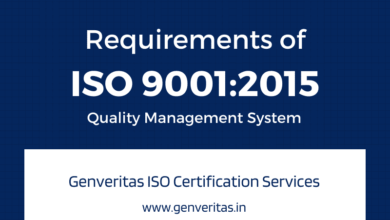Everything About ISO Certification in India

ISO certification is a globally recognized standard for quality management systems (QMS) that helps businesses improve their processes, customer satisfaction, and overall performance. In India, ISO certification is becoming increasingly important for businesses of all sizes to stay competitive and meet their customers’ expectations.
ISO Certification Process in India
The process for obtaining ISO certification in India is as follows:
- Choose an ISO Certification Body: The first step is to choose an ISO certification body that is accredited by the National Accreditation Board for Certification Bodies (NABCB) in India. The certification body should have experience and expertise in the relevant industry sector.
- Understand ISO Standards: The next step is to understand the ISO standard that is relevant to the business. The most commonly used ISO standards in India are ISO 9001 (for quality management systems), ISO 14001 (for environmental management systems), ISO 45001 (for occupational health and safety management systems), and ISO 27001 (for information security management systems).
- Conduct a Gap Analysis: The business needs to conduct a gap analysis to identify the gaps between the existing processes and the ISO standard requirements. This will help in identifying the areas that need improvement and preparing an action plan to address them.
- Implement the Action Plan: The business needs to implement the action plan to address the gaps identified in the gap analysis. This includes developing the necessary documentation, training the employees, and implementing the processes and procedures required by the ISO standard.
- Conduct an Internal Audit: The business needs to conduct an internal audit to check whether the implemented processes and procedures are meeting the ISO standard requirements. The internal audit should be conducted by an independent auditor who is not involved in the implementation process.
- Certification Audit: The certification body will conduct a certification audit to verify whether the implemented processes and procedures meet the ISO standard requirements. The certification audit is conducted in two stages – Stage 1 and Stage 2. During Stage 1, the auditor will review the documentation and assess the readiness of the business for the certification audit. During Stage 2, the auditor will assess the effectiveness and implementation of the QMS in the business.
- Obtain ISO Certification: If the business meets the ISO standard requirements, the certification body will issue the ISO certification. The certification is valid for three years, after which the business needs to undergo surveillance audits to maintain the certification.
Benefits of ISO Certification in India
There are several benefits of obtaining ISO certification in India, including:
- Improved business processes: ISO certification helps businesses to improve their processes and procedures, which leads to better efficiency, productivity, and quality of products and services.
- Increased customer satisfaction: ISO certification helps businesses to meet the expectations of their customers, which leads to increased customer satisfaction and loyalty.
- Better market opportunities: ISO certification is becoming increasingly important for businesses to stay competitive in the market. Many customers and businesses prefer to work with ISO-certified businesses as it provides assurance of quality and reliability.
- Compliance with regulations: Many government and regulatory bodies require businesses to have ISO certification to comply with their regulations. ISO certification can help businesses to meet these requirements and avoid penalties.
Conclusion
Obtaining ISO certification in India can provide several benefits for businesses of all sizes. It helps businesses to improve their processes, increase customer satisfaction, and stay competitive in the market. Businesses should choose an accredited ISO certification body and follow the process outlined above to obtain ISO certification.






